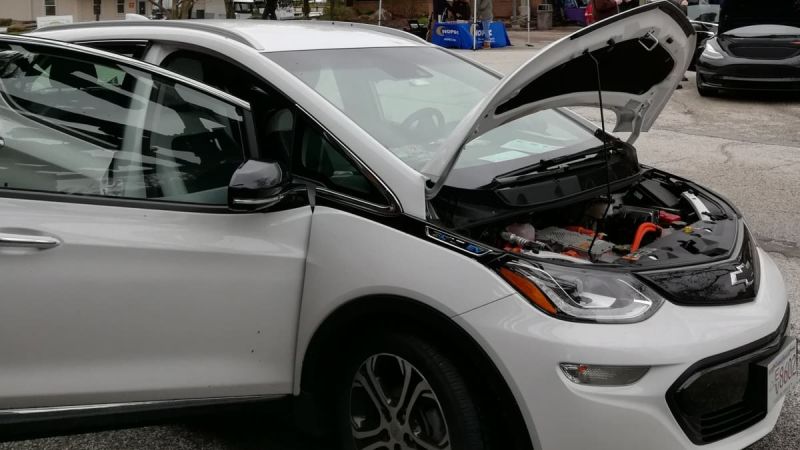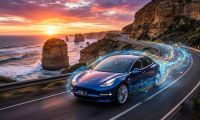General Motors comes in for a lot of flak from many corners, but the reliability of its electric vehicles is not often one of those criticisms leveled at the automaker.
Despite the frequent and unsubstantiated assertion from critics that the battery will be the most troublesome part of any electric vehicle to maintain, long-term owners of the Chevy Volt plug-in hybrid report excellent performance from the electric portion of the much-loved car.
Relieved of the burden of so many combustion engine parts, it follows that the all-electric Chevy Bolt EV reliability is shaping up to deliver an even better record than its now-retired predecessor. Let’s explore several key aspects of the vehicle and see if the Chevy Bolt EV is a reliable car to drive so far.
Early Adopters and the Chevy Bolt EV
It’s fair to say that drivers of the Chevy Bolt EV are early adopters of unproven technology.
Although GM’s Voltec powertrain was established and widely respected by the time the Bolt EV came along in 2016, the automaker had no track record with all-electric cars -- the EV1 fiasco notwithstanding. In fact, the Bolt EV was the first of its kind for any manufacturer at this mid-range price point, with Tesla still a year away from widespread delivery of the Model 3 and the first-generation Nissan Leaf’s range unable to stretch past the 200-mile mark.
At the same time, Nissan experienced some criticism about its battery management system and premature pack degradation, fueling concerns that new electric models like the Bolt EV would see similar problems two or three years down the line.
Well, here we are almost three years later, ready and able to judge just how reliable the Chevy Bolt EV has been to date.
Chevy Bolt EV Recalls
As with most cars, the Chevy Bolt EV has seen a handful of recall notices over its three model years.
One of the most recent, posted in September of 2018, covered an issue with the brake pistons that could reduce braking performance. The recall involved various models across GM’s stable of brands, including the higher end Cadillac and GMC labels, and was easily fixed by a free service at a local dealership.
To find recalls specific to the Chevy Bolt EV, we have to travel further back to the 2017 model year (the car’s first) and an issue unique to electric vehicles. In the spring of 2018, GM issued a voluntary recall for the 2017 Chevy Bolt EV and some early production 2018 models, involving a software issue in the battery management system.
While that issue was also a relatively simple fix with a new software update delivered by dealers, it does highlight an ongoing limitation for General Motors and other legacy manufacturers: the lack of OTA updates. This was one of our three items for GM to fix on the Chevy Bolt EV last month and remains a feature that would quickly raise the company above its immediate rivals, as well as that little bit closer to Tesla.
Going back further still, to the earliest 2017 Chevy Bolt EV model year, we do begin to find more serious teething problems for individual owners, such as replacement battery packs and problematic charge ports.
I recall a handful of tales on various Bolt EV forums about owners noticing diminished range and visiting their dealership expecting a minor fix, only to be told that they would receive a completely new battery pack for the vehicle.
It’s important to note, however, that these were individual issues that never received a wider recall.
GM reportedly went out to around 100 early owners to diagnose and remedy the cell leveling problem, so that those who follow them would never experience the issue. They are isolated cases in the first year of a new vehicle, driven by new technology and a new drivetrain.
All things considered, out of more than 50,000 Bolt EVs sold to date, the relatively small number of battery-specific problems - and the fact that they have largely occurred in early production vehicles - can be taken as a positive sign that General Motors has a firm handle on the monitoring and maintenance of its EV platforms.
(Anecdotally, I drive a 2017 Chevy Bolt EV that falls into the early production category and have only good things to report about battery capacity and performance!)
General Wear and Tear
This is perhaps the most vulnerable category for Bolt EV on reliability, because Chevrolet is positioned as a more affordable vehicle brand. As such, the components used in the Chevy Bolt EV are cheaper and more susceptible to scratches, dings, and other minor malfunctions that are nonetheless annoying for the owner.
Having never been as active in owner forums as I am with those of the Bolt EV, it’s hard to judge just how much of the criticism is commonplace for any vehicle in this class and how much of it is specifically down to the Bolt EV.
It isn’t unusual, for example, to have a couple of posts every week about unidentified noises and minor frustrations with parts of the car. Needing to reboot the Bolt’s infotainment system or having a wiper settle in the wrong position might not seem like reliability issues, but they speak to a broader view of overall quality and upkeep.
In terms of Chevy Bolt EV reliability, though, very few of the reported issues around wear and tear restrict the daily operation of the vehicle.
Perhaps the only true glitch that I’ve personally encountered over 25,000 miles that would fall into this category is phantom signals from the blind spot detection system. These started to appear around 17,000 miles in and are genuinely distracting, as they take the driver’s eyes off the road for something that isn’t there. Again, though, this was quickly fixed at a routine maintenance visit to our dealership. The technician also noted it as an issue that has appeared on other non-electric Chevrolet models, laying this issue more at the door of the brand, rather than one specific to Chevy Bolt EV reliability.
Allowing for a certain degree of cost-cutting and the inevitable fact that this brand doesn’t come with the same robust build and attention to detail that a high-end automaker might bring, general wear and tear on the Chevy Bolt EV is roughly what one would expect to see.
Battery Degradation
Tracking battery degradation is not as simple as it could be on the Chevy Bolt EV. Whereas first-generation electric vehicles like the Nissan Leaf offered a clear battery bar system and the Chevy Volt had a relatively low electric range that made it more noticeable when several miles disappear from a full charge, the Bolt has neither of these.
If I get fewer miles on a full charge than expected, it’s unlikely to show battery degradation. It’s typically because I’m going faster, using the HVAC system more often, or driving in significantly different temperatures than were experienced over the last full charge.
In order to accurately measure the Chevy Bolt EV’s reliability in terms of battery longevity, we would need to accumulate various data points from a broad section of Bolt EV drivers with diverse use cases. We know that General Motors has access to such data through its OnStar diagnostics system, as this is how the company flagged the isolated battery pack issues mentioned earlier.
Whether or not the automaker will share results with owners is another question, but CEO Mary Barra has proudly announced, on the topic of Chevy Volt and Bolt EV reliability, that no battery on these models has ever been replaced due to common degradation through everyday use.
For what it’s worth, the video below documents one high mileage owner’s attempt to calculate degradation and current battery reliability on his 2017 Chevy Bolt EV.
Again, it should be noted that this is just a single data point and other owners have questioned whether it can be applied to newer models. Measuring by range or available battery capacity can vary significantly across different vehicles and possibly even model years, as we can see from the improvement of battery management software in the 2019 Chevy Bolt EV.
Battery degradation is by its very nature a long-term concern and it really is too early to say for certain that the Chevy Bolt EV’s reliability in this area is assured. What we do know is that drivers with almost 100,000 miles under their belts report remarkably little degradation, even after potentially debilitating user habits such as regular DC fast charging and driving in extreme heat.
From what we know so far - and coupled with the proven reliability of the more complex Chevy Volt - the Chevy Bolt EV’s battery is carefully managed and can be relied upon to keep delivering more than 200 miles per charge well into the car’s life.
That being said, we’ll be taking a deeper dive into battery management and Chevy Bolt EV reliability in this area for a future story, so stay tuned if it’s a subject that interests you.
In summary, the Chevy Bolt EV has had its share of early battery teething problems specific to electric vehicles, as well as minor quibbles that would affect any vehicle, whether electric or combustion engine.
On its third model year, however, and backed up by the impressive track record of the Chevy Volt, Chevy Bolt EV reliability appears to be very good. General Motors has the battery pack management in a place that may feel conservative to some drivers, myself included, but which stands to deliver greater longevity to the car’s most critical component. The thermal management system is likely to negate some of the problems that afflicted the first-generation Nissan Leaf models and which continue to dog the brand to this day.
Here's more on why Nissan lost its lead as the premier non-Tesla EV brand.
A visit to any Chevy or GM electric vehicle forum should confirm the reliability of the Chevy Bolt EV, as well as highlighting a few niggling issues that owners still experience. In the grand scheme of things, the car's record is starting off very well given the troubles that more other manufacturers are facing.
If you drive a Chevy Bolt EV or a Chevy Volt, let us know in the comments how it’s holding up. See you in the next story where I am discussing what should be the minimum acceptable range for electric cars based on the case of 2020 Mini Cooper SE.
If you avoided the car on grounds of reliability, share what the problem was with us and if your alternative worked out as expected. See you in my next story where I am discussing 6 tips to prepare your electric car for the winter.
Steve Birkett is an electric vehicle advocate at Plug & Play EV. You can follow him on Twitter at @Plugandplayev, Instagram and Youtube at Plugandplayev Channel to send him EV news tips.
Set Torque News as Preferred Source on Google












Comments
Did you Receive the Federal
Permalink
In reply to I have had my 2018 Bolt EV by Bill Dwyer (not verified)
Did you Receive the Federal Tax credit? $7500
If you did you didn't mention it in your figures?
FYI, everyone wants
Permalink
FYI, everyone wants assurances of range and yet at 50k miles my 2017 Bolt needed new tires and Costco didn't have the OEM Michelin Engery Saver A/S tires in stock.
What they did have were Dunlop Turanza QuietTrack tires and my range dropped 20% immediately after installation. The ride was noticeably softer and quieter, but with my nightly routine of a 90% charge, I'm now getting ~160 miles on the GOM rather than the ~200 miles.
I guess I'll have to be choosier on my next set of tires...
Good point Tony, thanks. for
Permalink
In reply to FYI, everyone wants by TonyK (not verified)
Good point Tony, thanks. for the reminder. I don't think too many people have to replace the tires often, given the relatively light wear on them unless driving rough roads or hammering the instant torque on a regular basis. It's an interesting tradeoff, though, as improved traction helps to make more of the Bolt EV's power but obviously you take a hit on the range as you mention.
I've owned my Bolt EV since
Permalink
I've owned my Bolt EV since February 2017. 33K miles on the clock. All pretty much trouble free. Battery has been rock solid despite being an early build vehicle (built 11/23/16). One minor problem with the Lane Keep Assist camera that was quickly resolved by the dealership.
Thanks for sharing what you
Permalink
In reply to I've owned my Bolt EV since by David Vangerov (not verified)
Thanks for sharing what you've seen. The electronics do seem to be one common source of dealership visits, although that's not exclusive to the Bolt EV and the trouble areas always seem to be fixed quickly. Key components like the battery are what most people ask about and we seem to be in good shape there, a few early replacements notwithstanding.
My cousin had just bought a
Permalink
My cousin had just bought a 2018 Bolt when I moved in with him, and I came to.enjoy it so much that we now share ownership of it. He uses it in his window washing business and people often ask him about his ownership experience. The car has been absolutely reliable; however, he did spill a jug.of water in the rear cargo area and it shorted out the entire audio system. $1200 to repair at the dealer. Just be very careful with fluids in the car! Both of us enjoy the Bolt every day.
Ha, hard to lay that one on
Permalink
In reply to My cousin had just bought a by Robert Norris (not verified)
Ha, hard to lay that one on the car itself but I'm sure it was frustrating nonetheless! Glad everything else is working out well and that you're both able to enjoy the car.
I have a 2012 Chevrolet volt
Permalink
I have a 2012 Chevrolet volt with 67,000 miles on it. The only service that's been done has been tire rotation, oil change and software updates. The only glitch is the check engine light pops on from time to time during hot weather and the code indicates a issue with the cooling system. And the weather goes back down into the 80s and the light goes off again. This happened 4 years ago and it was a software update fix so I'm hoping that is the issue again. The air conditioning works great!
My 2017 bolt has 70,000 miles
Permalink
My 2017 bolt has 70,000 miles. The car is great. When I first got the car I would see 250 miles of range on a full charge. I'm down to 220 but I've used it pretty hard. I also drive freeway at 75 miles an hour 120 miles a day with AC for half of that.
I have had my Chevy Bolt
Permalink
I have had my Chevy Bolt since early 2017 and have 115000 kms on it now and no problems or degradation to speak of, and I drive long distance every day even in a Canadian winter. I lose about 20%, of my range to the cold and snow tires in the winter but in the spring it comes right back to normal. Great car, build more EVs GM in all shapes and sizes please
Just a bunch of gushing
Permalink
Just a bunch of gushing comments for GM or their Volt or their BOLT All a part of an article that plainly states :"Advertisement"
Just as dishonest as their products. The VOLT was a failure and the BOLT is on its way to the dustbin of history. Next will be the JOLT followed by the DOLT and bankruptcy. Run off Mary Barra and make an all in decision for electric (BEV) and they just may avoid a disastrous bankruptcy.
My, my so cranky. And also
Permalink
In reply to Just a bunch of gushing by [email protected] (not verified)
My, my so cranky. And also incorrect. I previously pointed out two defects I have encountered in driving a Chevy Bolt. A defective suspension part was replaced in warranty. I also pointed out the infotainment system experiences unexpected inappropriate reboots. Having said that, the reliability of the Chevy have not seriously affected its availability or usability for its intended purpose. On the other hand I previously owned a 2011 Nissan LEAF which stuck me with several repair bills in excess of US $1,000. The LEAF experienced an electrical failure in the electronic brake boost circuit which resulted in loss of ability to apply the brakes.
One of the more significant concerns of electric car buyers is how long the battery will last. Two years into owning the Bolt, I have not noticed a measurable loss of battery capacity - probably because the battery is liquid temperature regulated, On the other hand the LEAF experienced noticeable battery deterioration and loss of driving range. By the time the LEAF had 30,000 miles, it had lost 20% of its battery capacity.
I just hit 9,000 recently on
Permalink
I just hit 9,000 recently on my 2019 Bolt. Tuesday morning I opened the garage door to hear a noise like a Lincoln arc welder on 225. I unplugged and popped the hood to find a lot of heat bleeding off the top of the charger. The vehicle booted up with no trouble light indicators so I drove to work. The following day on the way home the region braking quit. The touch screen began occasional malfunctions. Then it went into drivetrain low power mode. I felt lucky it didn't malfunction in any dangerous manner. I garaged it today and will be taking it to Chevy in the morning.
Any updates on what happened
Permalink
In reply to I just hit 9,000 recently on by Phil Penner (not verified)
Any updates on what happened to your Bolt?
The suspension part fixed the
Permalink
In reply to Any updates on what happened by Ned (not verified)
The suspension part fixed the rattle and it has been over a year and no recurrent issues.
The infotainment system software available for me to download has not, as far as I know, been updated. I have continued to experience fairly rare spontaneous reboots at vehicle where the infotainment screen experiences a black screen freeze. The system appears to have a watchdog timer that will cause what appears to be a cold boot and return to normal operation within at most a few minutes. Pressing and holding the Home and Forward button for about ten seconds can also be used to trigger a cold reboot. The cold boot process seems to take about 15 seconds. It appears that the infotainment system is usually held in an idle state when the vehicle is not switched on. Typically, the infotainment system shows an image almost immediately when the vehicle is powered on.
I have a 2019 Peimier. I love
Permalink
I have a 2019 Peimier. I love this car. Have not had so much fun driving since I had my Corvette. GM has hit a home run with this vehicle.
Bought 2018 bolt ev in March
Permalink
Bought 2018 bolt ev in March of 18. 65k miles, new tires at 60k. Drive 160+ miles round trip to work. No problems, car runs great. In northern Ohio, so plenty of cold and snow.
92,017 miles and no problems.
Permalink
92,017 miles and no problems. I have calculated the degradation and it’s between 3-5 %. As good as Tesla’s and as good as a gas car. Don’t forget gas cars lose their miles per gallon also. My 92 Saturn lost 10% over 8 years. Also drove my car last summer 903 miles in 24 hrs no problem. Holds up great.
I have a 2019 Chevy Bolt
Permalink
I have a 2019 Chevy Bolt Premier.
The only compaints I have are fully charged can be 200 miles down to 170 miles. I have never reached 240 miles.
If you turn on the heater, you instantly loose 30 miles.
The Bluetooth often doesn't work unless you select the link again on your phone, even though it says it's already connected.
My biggest concern is when you do drive in L gear and you one peddle drive, when you stop, the brake lights don't come on. You have to press the brake while your stopped.
You are correct. When single
Permalink
You are correct. When single peddle driving, the brake lights turn on when the deceleration is greater than 0.2 G. Unfortunately, as the car comes to a stop, when the deceleration drops below 0.2G, the brake lights shut off. I am sure GM must have had their reasons, however I would have preferred for the brake lights to latch on until positive acceleration is sensed. At a red light it is necessary to step on the brake so that drivers behind you will know you’re stopped.
Not sure about Bluetooth issues. I have used iPhone 6S and Moto X and not had issues. I have seen bugs on incoming phone calls with iPhone IOS 12-13 that the call rings in in the phone instead of through infotainment when NOT using CarPlay. In CarPlay, navigation voice prompt volume can only be adjusted while CarPlay is speaking a prompt. These seem to be IOS bugs, and not so much the car’s fault.
There is an infotainment bug where every few months the screen will stay black when the car is switched on. About a minute later, the screen will do a reboot and resume operation. This is a known issue as other owners have reported the same thing on the owner’s forum. It has been over a year since GM updated the firmware.
Jan 2017 car 36,000 miles. I
Permalink
Jan 2017 car 36,000 miles. I haven't noticed any particular degradation in battery - it's a bit lower now in the winter, but I expect that.
Had an issue recently with a clunking in the suspension/steering, dealer fixed easily - doesn't appear to be related to electric, could have occurred on any car. I might have run over a pothole or such, who knows?
Still have occasional issues with the infotainment - a reboot fixes, and after a software fix years ago it is now an occasional nuisance as opposed to a real issue.
Overall, biggest issues in Chevy's control are rate of L3 charge (really wimpy charger in the car makes long distance driving painful), poor seats - particularly in the front, and the infotainment reboot issue. Outside of Chevy's control is public L3 charging infrastructure, which is getting better but is still pretty marginal for those of us not driving Teslas.
I'll never go off electric and this car has been fantastic. I bought it figuring that the Tesla model 3 would be delayed as boy was it ever. No regrets in the slightest, I just wish more people would give electric a chance.
I had the same problem with a
Permalink
In reply to Jan 2017 car 36,000 miles. I by Tim (not verified)
I had the same problem with a sporadic clunking or creaking Sound in the Bolt’s suspension that started about three months after I got the car. It was not safety related, only aesthetic. The cause was a bushing on the left stabilizer link. It was fixed by the dealer under warranty in about a 30 minutes and a battery control firmware update was done at the same time. There is a TSB on the suspension noise, so ask your dealer to read the TSB if the dealer are skeptical you hear a noise. Other than license plates, electricity and window washer fluid, I have had no maintenance costs with the Bolt. The Bolt costs more up front, but the lower operating costs help to offset the price differential.
I have seen glitches in other infotainment systems. I previously had a 2011 LEAF that had sporadic hangs in the infotainment system that could happen at any time. The Bolt’s hangs seem to occur only at power-on and are quite rare. There appears to be a watchdog timer that reboots the infotainment after about 60 seconds unresponsive, or if you don’t want to wait, I believe pressing forward and home buttons simultaneously for about five seconds with force a reboot. The latter is handy if you want access to the HVAC on-screen buttons.
I agree: I wish DC fast charging were faster. It seems like GM erred on the side of being conservative in deference to prolonging the service life of the battery. In all fairness, I have used DC fast charging rarely. The reasonably large battery makes slower AC charging at home useable because it isn’t necessary to make every trip with a full battery - any more than one would fill up a gasoline powered car before every single trip.
I have 73,000 on my 2017 bolt
Permalink
I have 73,000 on my 2017 bolt EV full charge show around 220-miles met a person at a nearby fast charger that has 144,000-miles with about the same range and they told me they fast charge around 80% of the time as they are a Lyft driver. I have noticed when it got colder the range dropped to around 180-miles to accommodate using the heater..
I have a 2012 chevy volt have
Permalink
I have a 2012 chevy volt have 156000 on it only issue I have had is the battery coolent sensor issues. It seems to be a widespread problem that gm hasn't fixed or recalled. Other than that it has been reliable.
This guy is an ass. I own a
Permalink
I own a 2017 Bolt EV Premier with 60k miles on it and it is a GREAT car.
I am not sure I would agree
Permalink
I am not sure I would agree the Chevy Bolt is, “unproven technology.” Perhaps, unproven packaging of EV technology would be a more fair statement. GM, even though it has been through debt reorganization, has been invested in battery and traction motor technology longer than anyone else, including Tesla, going back to the 1960s. GM also runs one of, if not the largest, battery research laboratories. GM’s EV steps have been faltering indeed, but it would be unwise to underestimate GM’s depth of technological capability that could be brought to bear - if only GM wanted to do so.
I also disagree with the article’s author’s assertion that GM is inferior in paint and coating technology because some GM models are inexpensively priced. The base metal passivation and paint coating techniques GM uses have been developed over 20+ years. Also the choices of types of plating and base metals used in the fasteners have been made for compatibility and to discourage corrosion. It remains to be seen if competitors such as Tesla have done their metallurgical homework. I live in the US Midwest where road salt and deicing chemicals are heavily used, and they’re very bad at inducing corrosion. Tesla units just started selling in measurable quantities around here in the last six months. This is first winter for Tesla en masse here in the Midwest, so it will be interesting to see how the Model 3 fleet stands up to our corrosive road chemicals. Early reports are that Tesla Model 3 has problems with easily chipped paint and a problem with rubbing through the paint where the cowl touches the A-pillar on the drivers side. Time will tell.
I have leased a 2017 bolt for
Permalink
I have leased a 2017 bolt for almost 3 years now. It has been a great car until about 10 days ago. I had noticed a decrease to about 185 miles at full charge. I didn't get the recall software upgrade because I only have 8800 miles on the car and haven't needed other service. I drove to San Diego from Pasadena last week, then back on a full charge. That charge was only 160 miles, which worried me. I got off the freeway in Pasadena with 30 miles on the charge left. Six blocks from home, I lost propulsion suddenly. Had the car towed and was able to charge only to 117 miles. I took the car to the dealer. After the software upgrade, the battery seemed to be bleeding charge at 4 times the usual rate. I charged back to 117 full charge and took the car back. Now the problem: the dealer acknowledged a problem and could only charge to 130 miles. They say there is no error message, so they have a "question" in to GM engineers. That has been the case now for six days with no answer from GM. I don't consider this good service. They appear to be paralyzed and don't want to replace the battery pack. I'm very disappointed in how this has been handled.
I had the battery monitor
Permalink
In reply to I have leased a 2017 bolt for by Mary Kennedy (not verified)
I had the battery monitor software update done on my 2017 Chevy Bolt about nine months after I got the car. When I departed to the dealer, the Bolt had a range estimate of about 290 miles, of which I used about 20 to get to the dealer. When I left the dealer the range estimate was showing 180. After some driving and two recharges, the range estimate displayed was back to normal.
I believe nothing bad happened. The cumulative KWH/mile history is over written by the software update and set to zero. In my own case, the computer apparently believed 5 KWH had been expended to go zero miles and that resulted in a pathetic range estimate being displayed. Once computer had some realistic data in its history, it was able to once again display a reasonable range estimate. The post update spurious range display has been noted by quite a few Bolt drivers on the Bolt owners forum. The Chevy service bulletin should instruct dealers to tell owners the range estimate may be off temporarily following the update.
I stand corrected; apologies.
Permalink
In reply to I had the battery monitor by Bill (not verified)
I stand corrected; apologies. I overlooked the loss of propulsion in addition to the reduced range. That sounds like a possibly a case of something more serious than the computer miscalculating the available range. I believe the dealer ought to be able to retrieve diagnostic info from the car. It seems like it would be a good idea to let the dealer keep the car for a few days and put the car through several drive and charge cycles, especially if there is no diagnostic information stored in the car. Further, according to several web sites, GM receives “real time” information on battery cell voltage via OnStsr telematics. It was reported a small number of 2017 Bolts did suffer from cell voltage reduction that could result in loss of propulsion, and that GM contacted the affected customers directly based on the diagnostic information GM receives from the cars.
The dealer sees no error
Permalink
In reply to I stand corrected; apologies. by Bill (not verified)
The dealer sees no error signals. They are doing nothing until they hear from "GM engineering". They have been waiting to hear now for 7 days. They are paralyzed.
Pagination